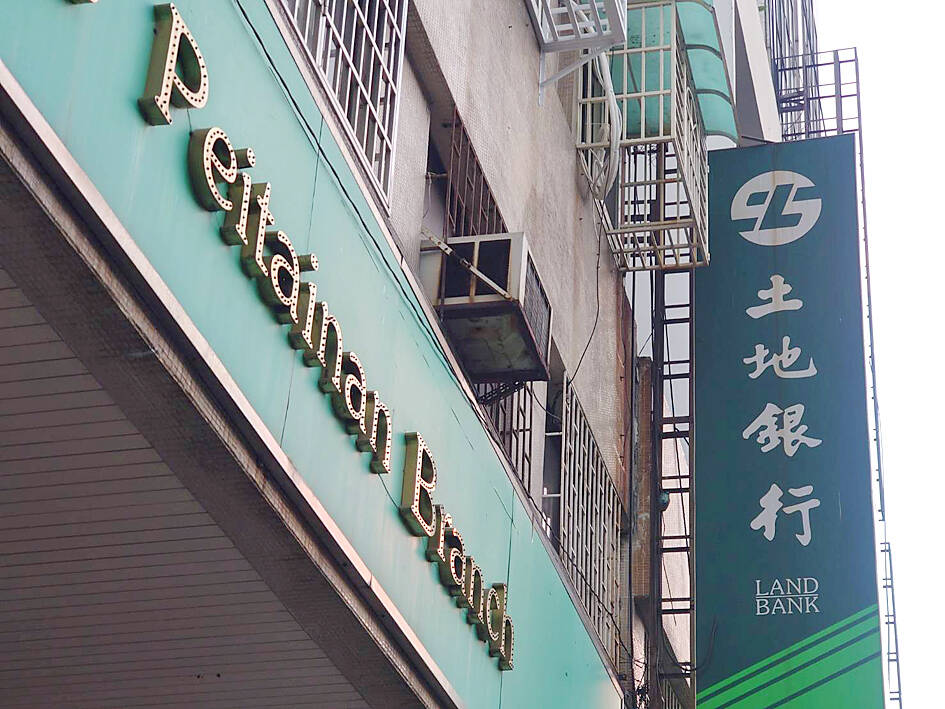Interest rates on new loans at Taiwan’s five major state-run banks last month rose 23 basis points to an average of 2.051 percent as loan demand picked up, the central bank said yesterday.
The monetary policymaker analyzed data from Bank of Taiwan (臺灣銀行), Land Bank of Taiwan (土地銀行), Taiwan Cooperative Bank (合作金庫銀行), Hua Nan Commercial Bank (華南銀行) and First Commercial Bank (第一銀行).
The uptick was most evident for mortgage lending, which rose 8 basis points to 2.079 percent, driven by real demand and completion of new residential properties, although the central bank has kept interest rates unchanged since June, central bank research official Tsao Ti-jen (曹體仁) said.

Photo: Wang Chieh, Taipei Times
The mortgage balance increased by NT$9.39 billion (US$299.73 million) to a record NT$98.96 billion, Tsao said, adding that loans backed by a government interest subsidy program accounted for 36.48 percent, or NT$36.1 billion.
The rise in mortgage volume was linked to seasonality, as it is common for developers in Taiwan to complete construction on presale residential projects and book profits ahead of the Lunar New Year holiday, he said.
Prospective home buyers also prefer to close deals toward the end of the year in keeping with tradition, he added.
Last year, mortgage operations at the five state-run banks expanded 8.4 percent from 2022, milder than the advances of 12.6 and 20 percent in the previous two years, Tsao said.
“I would not describe the pace of increases as a sign of overheating, but the central bank will continue to pay close attention to the housing market,” Tsao said, adding that interest subsidies are for purchases of first homes, suggesting that healthy real demand is upholding the house transaction data.
Interest rates on new working capital climbed to 2.015 percent, as companies sought cash to support the distribution of bonuses, he said.

The New Taiwan dollar is on the verge of overtaking the yuan as Asia’s best carry-trade target given its lower risk of interest-rate and currency volatility. A strategy of borrowing the New Taiwan dollar to invest in higher-yielding alternatives has generated the second-highest return over the past month among Asian currencies behind the yuan, based on the Sharpe ratio that measures risk-adjusted relative returns. The New Taiwan dollar may soon replace its Chinese peer as the region’s favored carry trade tool, analysts say, citing Beijing’s efforts to support the yuan that can create wild swings in borrowing costs. In contrast,

Nvidia Corp’s demand for advanced packaging from Taiwan Semiconductor Manufacturing Co (TSMC, 台積電) remains strong though the kind of technology it needs is changing, Nvidia CEO Jensen Huang (黃仁勳) said yesterday, after he was asked whether the company was cutting orders. Nvidia’s most advanced artificial intelligence (AI) chip, Blackwell, consists of multiple chips glued together using a complex chip-on-wafer-on-substrate (CoWoS) advanced packaging technology offered by TSMC, Nvidia’s main contract chipmaker. “As we move into Blackwell, we will use largely CoWoS-L. Of course, we’re still manufacturing Hopper, and Hopper will use CowoS-S. We will also transition the CoWoS-S capacity to CoWos-L,” Huang said

Nvidia Corp CEO Jensen Huang (黃仁勳) is expected to miss the inauguration of US president-elect Donald Trump on Monday, bucking a trend among high-profile US technology leaders. Huang is visiting East Asia this week, as he typically does around the time of the Lunar New Year, a person familiar with the situation said. He has never previously attended a US presidential inauguration, said the person, who asked not to be identified, because the plans have not been announced. That makes Nvidia an exception among the most valuable technology companies, most of which are sending cofounders or CEOs to the event. That includes

INDUSTRY LEADER: TSMC aims to continue outperforming the industry’s growth and makes 2025 another strong growth year, chairman and CEO C.C. Wei says Taiwan Semiconductor Manufacturing Co (TSMC, 台積電), a major chip supplier to Nvidia Corp and Apple Inc, yesterday said it aims to grow revenue by about 25 percent this year, driven by robust demand for artificial intelligence (AI) chips. That means TSMC would continue to outpace the foundry industry’s 10 percent annual growth this year based on the chipmaker’s estimate. The chipmaker expects revenue from AI-related chips to double this year, extending a three-fold increase last year. The growth would quicken over the next five years at a compound annual growth rate of 45 percent, fueled by strong demand for the high-performance computing